It’s possible that I shall make an ass of myself. But in that case one can always get out of it with a little dialectic. I have, of course, so worded my proposition as to be right either way (K.Marx, Letter to F.Engels on the Indian Mutiny)
Wednesday, January 01, 2020
THE GHOSN ONE
Ghosn says he escaped 'injustice' in Japan; Lebanon calls arrival a private matterBEIRUT/TOKYO (Reuters) - Ousted Nissan boss Carlos Ghosn said on Tuesday he had fled to Lebanon to escape a “rigged” justice system in Japan, raising questions about how one of the world’s most-recognized executives had slipped away while on bail.
Ghosn’s abrupt departure marks the latest twist in a year-old saga that has shaken the global auto industry, jeopardised the alliance of Nissan Motor Co Ltd and top shareholder Renault SA and increased scrutiny of Japan’s judicial system.
“I am now in Lebanon and will no longer be held hostage by a rigged Japanese justice system where guilt is presumed, discrimination is rampant, and basic human rights are denied,” Ghosn, 65, said in a brief statement on Tuesday.
“I have not fled justice - I have escaped injustice and political persecution. I can now finally communicate freely with the media, and look forward to starting next week.”
RELATED COVERAGE
Factbox: Carlos Ghosn joins list of execs fighting extradition
Beirut says it doesn't know how Nissan ex-boss Ghosn made it to Lebanon
Tokyo officials have previously said the system is not inhumane and that Ghosn, who is facing trial on financial misconduct charges he denies, has been treated like any other suspect.
It was unclear how Ghosn, who holds French, Brazilian and Lebanese citizenship, was able to orchestrate his departure from Japan. He had been under strict surveillance by authorities while out on bail and had surrendered his passports.
According to a senior Lebanese foreign ministry source, Ghosn entered Lebanon legally on a French passport and using his Lebanese ID with normal security procedures. People familiar with the matter told Reuters he had arrived in Beirut on a private jet from Istanbul on Monday.
The French and Lebanese foreign ministries both said they were unaware of the circumstances of his journey. “All discussion of it is his private matter,” the Lebanese ministry added.
Lebanon’s state security directorate said Ghosn will not face any legal consequences for the way he entered the country, state NNA news agency reported. The foreign ministry said Lebanon did not have a judicial cooperation agreement with Japan.
Japanese authorities had no record of Ghosn leaving, Japanese public broadcaster NHK said. A person resembling him entered Beirut international airport under a different name, NHK reported, citing an unidentified Lebanese security official.
His lawyers were still in possession of his three passports, one of his lawyers, Junichiro Hironaka, told reporters.
Hironaka, in comments broadcast live on NHK, said the first he had heard of Ghosn’s departure was on the news this morning and that he was surprised. He also said it was “inexcusable behaviour”.
Japan has extradition treaties with only the United States and South Korea, according to the justice ministry, meaning it could be difficult to force Ghosn to return to stand trial.
While his arrest on financial misconduct charges last year ensured a dramatic fall from grace in Japan, he retains more popularity in Lebanon, where billboards saying “We are all Carlos Ghosn” were erected in his support and he was previously featured on a postage stamp.
Born in Brazil of Lebanese ancestry, Ghosn grew up in Beirut and has retained close ties to Lebanon.
At Ghosn’s gated villa in the Achrafieh neighborhood of Beirut, a handful of police and private security personnel stood guard on Tuesday.
A man who identified himself only as his English neighbor walked by to leave a card, with the words “Carlos, welcome home!” written inside. It was not immediately clear if Ghosn was at the address.
“It’s a good thing that at last he’s out of being locked up for something which he may or may not — probably not — have done,” said the neighbor.
A French minister said before the report Ghosn used a French passport that she was “very surprised” by news of his emergence in Lebanon.
FLIGHT RISK
Ghosn was first arrested in Tokyo in November 2018, shortly after his private jet touched down at the airport. He faces four charges - which he denies - including hiding income and enriching himself through payments to dealerships in the Middle East.
Nissan sacked him as chairman saying internal investigations revealed misconduct including understating his salary while he was its chief executive, and transferring $5 million of Nissan funds to an account in which he had an interest.
The case sparked international criticism of Japan’s justice system, in which 99.9 percent of people charged with crimes are convicted and defence lawyers are prohibited from being present during interrogations that can last eight hours a day.
Ghosn was initially released in March on a record $9 million bail only to be arrested on related charges weeks later and then released on bail again at the end of April.
His movement and communications have been monitored and restricted to prevent his fleeing the country and tampering with evidence, the Tokyo District court previously said.
The terms of his bail have also been striking by Western standards. He has been prevented from communicating with his wife, Carole, and had his use of the internet and other communications curtailed.
Carole is now with him in Lebanon at a house with armed guards outside, the New York Times reported, citing a person familiar with the matter.
HOUSE ARREST
Ghosn did not believe he would get a fair trial in Japan and was “tired of being an industrial political hostage”, one person told The Wall Street Journal.
A person familiar with Nissan’s thinking told Reuters: “I think he gave up fighting the prosecutors in court.”
The trial was widely expected to start in April. Ghosn’s Japanese lawyers have fought, so far unsuccessfully, to get access to 6,000 pieces of evidence collected from Nissan, which they say is crucial to a fair trial.
Ghosn has said he is the victim of a boardroom coup, accusing former Nissan colleagues of “backstabbing” and describing them as selfish rivals bent on derailing closer ties between the Japanese automaker and its biggest shareholder Renault, of which Ghosn was also chairman.
His lawyers have asked the court to dismiss all charges, accusing prosecutors of colluding with government officials and Nissan executives to oust him to block any takeover by Renault.
Ghosn began his career in 1978 at tyre maker Michelin. In 1996, he moved to Renault where he oversaw a turnaround that won him the nickname “Le Cost Killer.”
After Renault sealed an alliance with Nissan in 1999, Ghosn used similar methods to revive the ailing brand, leading to business super-star status in Japan, blanket media coverage and even a manga comic book on his life.
Surveillance in a leafy enclave, Ghosn's Tokyo life was under strict monitoring
TOKYO (Reuters) - The imposing home where Carlos Ghosn lived for the last seven months and probably launched a daring escape to avoid Japanese prosecutors is nestled in a leafy enclave of Tokyo where most people pay little attention to Westerners or luxury cars.
Yet neighbors say it was impossible not to notice one of the world’s most famous executives, or the black car that seemed to idle nearby whenever he was around - a stark reminder of the surveillance on the ousted Nissan Motor Co chairman while out on bail for financial misconduct charges.
Ghosn on Tuesday said he had fled to Lebanon to escape a “rigged” justice system in Japan, an astonishing revelation that raises questions about how one of the world’s most-recognized businessmen slipped past authorities, especially after he had surrendered his passports under the terms of his bail.
Hana Takeda, who lives in an apartment close to the house where Ghosn has lived since May, said she would sometimes see him out walking with one of his three daughters.
“He wasn’t very secretive. I would see him hanging around with his daughter,” Takeda, 28, told Reuters.
The large, multi-level house is not far from the central Roppongi district in an area popular with diplomats and western executives.
There is a police presence because of the proximity of at least one embassy and houses for diplomats. Many homes had western luxury cars parked outside, including BMWs, Land Rovers and Bentleys.
Three wireless security cameras peered out from the balcony above the brick porch. Under the terms of his bail, Ghosn had to have cameras installed at the house’s entrance.
No one came to the door when a Reuters reporter rang the doorbell. A double garage was shut and net curtains were drawn across the windows. Upper floor windows were covered by blinds.
A policeman on a bicycle made regular rounds through the small neighborhood.
Another neighbor, 62-year-old American Whitney Rich, said he had sometimes noticed a black car near the house.
Ghosn was initially arrested in Tokyo in November 2018 and faces four charges, which he denies. They include hiding income and enriching himself through payments to Middle East dealerships.
It seems unlikely he will now stand trial in Tokyo as Japan has no extradition treaty with Lebanon.
AUDACIOUS ACCOUNT
It was unclear how Ghosn, who holds French, Brazilian and Lebanese citizenship, was able to orchestrate his departure from Japan. He entered Lebanon legally on a French passport, one source has told Reuters.
In one audacious account from Lebanese TV news channel MTV, which Reuters has not been able to verify, a group of musicians arrived at Ghosn’s Tokyo house, performed and then packed up their instruments with him inside one of the larger cases. He was then whisked to the airport and out of the country with the help of privately hired security.
What is clear is that Ghosn was tightly monitored - a fact that has made his escape all the more spectacular. Authorities had monitored and restricted his movement and communications to prevent him, they said, from fleeing or tampering with evidence.
There always seemed to be a car at the end of the street near Ghosn’s house, said one Western expat who had lived in the area for nine months.
“He kept a low profile... There was a car parked constantly nearby,” the expat said, declining to be identified.
“He was under constant surveillance.”
Ghosn flight prompts talk of more curbs in Japan's strict justice system
TOKYO (Reuters) - Carlos Ghosn’s daring flight from Japan, where he was awaiting trial on charges of financial wrongdoing, has revived global criticism of the nation’s “hostage justice,” but in Japan is prompting talk of reversing more lenient curbs on defendants.
The ousted boss of Japan’s Nissan Motor Co and France’s Renault SA fled to Lebanon, saying on Tuesday that he had “escaped injustice” and would “no longer be held hostage by a rigged Japanese justice system.”
Ghosn was first arrested in November 2018 when his private jet landed in Tokyo and kept in jail for more than 100 days as prosecutors added more charges, all of which he has denied. He was released on $9 million bail in March - only to be arrested and bailed again the following month.
He was facing four charges, including underreporting his Nissan salary and transferring personal financial losses to his employer’s books while he ran Japan’s No. 2 automaker.
His apparent escape from Japan’s legal system - Tokyo and Lebanon don’t have an extradition treaty - will likely halt or even reverse a trend of recent years toward granting bail in more cases, said Colin Jones, a law professor at Doshisha Law School in Kyoto.
“I would expect it to be more difficult for foreign defendants to get bail,” Jones said.
In Japan, suspects who deny the charges against them are often detained for long periods and subject to intense questioning without a lawyer present, a system critics call “hostage justice.”
Japanese civil rights groups and the main bar lawyers association have long criticized a system that convicts 99.9% of criminal defendants. They say it gives too much power to prosecutors, who can detain suspects for long periods before indictment, and relies too much on confessions, some later found to have been forced and false.
Ghosn’s escape is clearly a shock to Japan’s legal establishment.
“This case raises the extremely serious issue of whether it’s all right to continue the trend toward bail leniency,” said former prosecutor Yasuyuki Takai.
“The legal profession and lawmakers need to quickly consider new legal measures or a system to prevent such escapes,” Takai, who was formerly with the special investigation unit of the prosecutor’s office, told public broadcaster NHK.
“Until the way to achieving this is in sight, we should carefully consider temporarily halting this trend toward bail leniency.”
The Tokyo District Court granted Ghosn bail over the objection of prosecutors because of his lawyer’s assurances that the former executive would observe his unusually strict bail conditions - which included surrendering his passports, barring him from seeing his wife Carole or using the internet outside his lawyers’ office.
“But this trust was betrayed and even this high bail didn’t prevent him from fleeing the country,” Takai said.
Tokyo-based lawyer Stephen Givens said Japan’s political right is using Ghosn’s flight to say, “See, we caved in to Western demands and look what happened.”
Still, Givens said the Ghosn case likely won’t reverse the recent trend of greater willingness to grant bail, as Japan was becoming more sensitive to foreign criticism.
The bold escape “may provide grounds for a backlash but only in very unusual cases,” he said.
---30---
Report Finds Puerto Rico Is Affected by Climate Change More Than Anywhere Else in the World
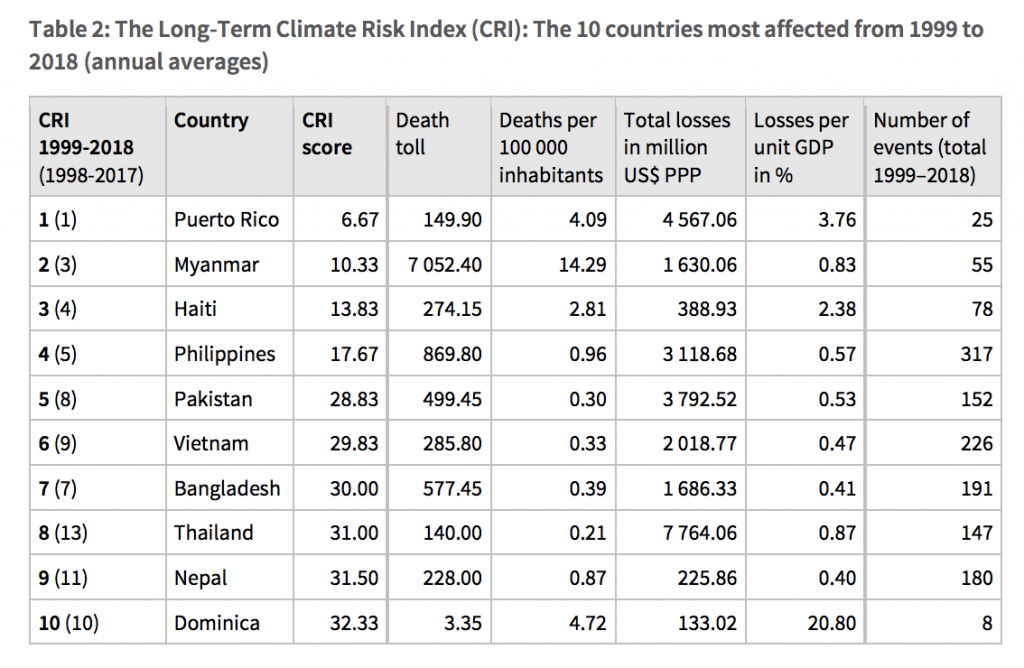 Germanwatch
Germanwatch
A new report looking at weather-related calamities across the globe found that Puerto Rico is affected by climate change more than anywhere else in the world.
According to think tank Germanwatch’s Global Climate Risk Index 2020, the Caribbean archipelago is the “most affected country” from 1999 to 2018, followed by Myanmar at No. 2 and Haiti at No. 3. The two Caribbean islands, Puerto Rico and Haiti, are the only Latin American entities to make the list.
The study takes into account both the number of weather-related events as well as the impact of the catastrophes in the 20-year period.
 Germanwatch
Germanwatch
In 2017, the Category 4 Hurricane María covered almost the entire archipelago, completely wrecking its infrastructure, leaving most people without electricity for months, thousands deceased and even more homeless.
“The Climate Risk Index may serve as a red flag for already existing vulnerabilities that may further increase as extreme events will become more frequent or more severe due to climate change,” the report reads.
According to the study, poor and developing countries are most vulnerable to climate risks and are often hit the hardest, seeing higher rates of deaths and hardships. Despite this, researchers also found that high-income countries are also feeling climate impacts more than ever before.
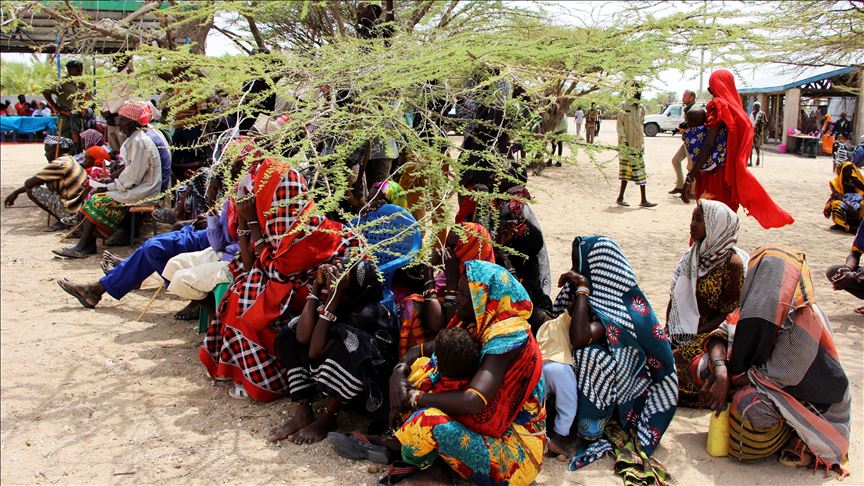
NAIROBI, Kenya
Northern Kenya is facing looming starvation after a recent invasion by locusts that originated from neighboring Somalia, officials said Tuesday.
Local authorities from the Wajir County Department of Agriculture told reporters that the locusts, coming from southern Somalia "moved around for close to two hours before settling eight to 10 kilometers away from Kutulo town."
Kutulo is roughly 45 kilometers (28 miles) from the Kenya-Somalia border.
Farmer Hassan Ahmed, 44, told Anadolu Agency: "The locusts have destroyed ready farm produce. The rains have been good and we have grasslands for our animals, but the locusts eat anything they find as long as its green."
Like many residents of the Wajir and Mandera counties who are mostly pastoralists, Ahmed said that the locusts were eating all the grass meant for the animals. "No pasture means a loss to our livelihood, we can't get enough milk from our animals and eventually they will die," he said.
According to the UN Food and Agriculture Organization (FAO) an outbreak of desert locusts in Somalia destroyed thousands of hectares of crops in, the worst such incident in over 25 years.
In a statement, the FAO said desert locusts continue to breed in Galmudug, Puntland and Somaliland, warning that an estimated 70,000 hectares of land have been infested by the insects, damaging crops and pastures in Ethiopia and Somalia.
---30---
NEW DELHI, INDIA - DECEMBER 30 : Protesters march towards the India Gate during a protest against the police brutality during the clashes, following days of violent protests across India against a new citizenship law, in Delhi, India on December 30, 2019.
PHOTO ESSAY
( Imtiyaz Khan - Anadolu Agency )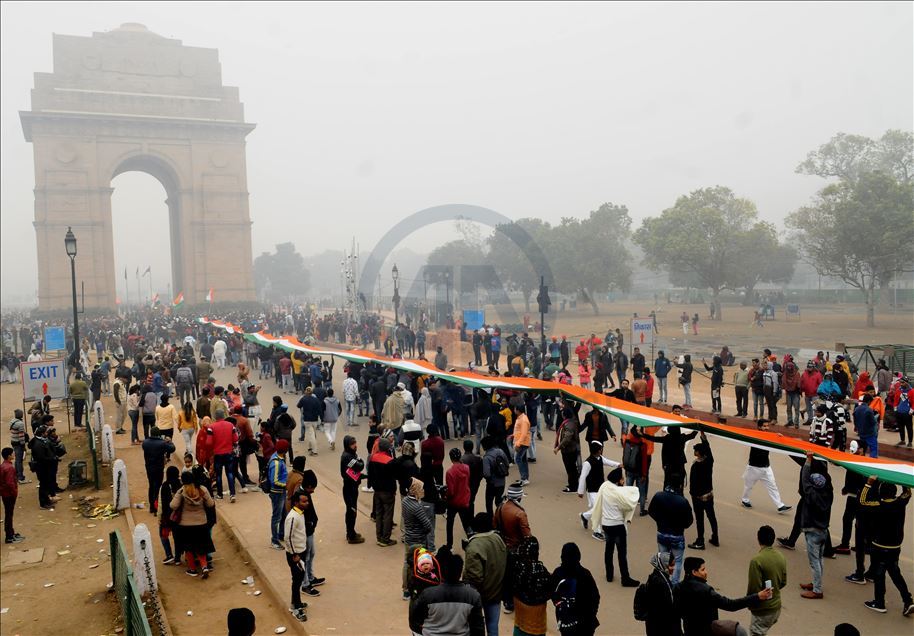
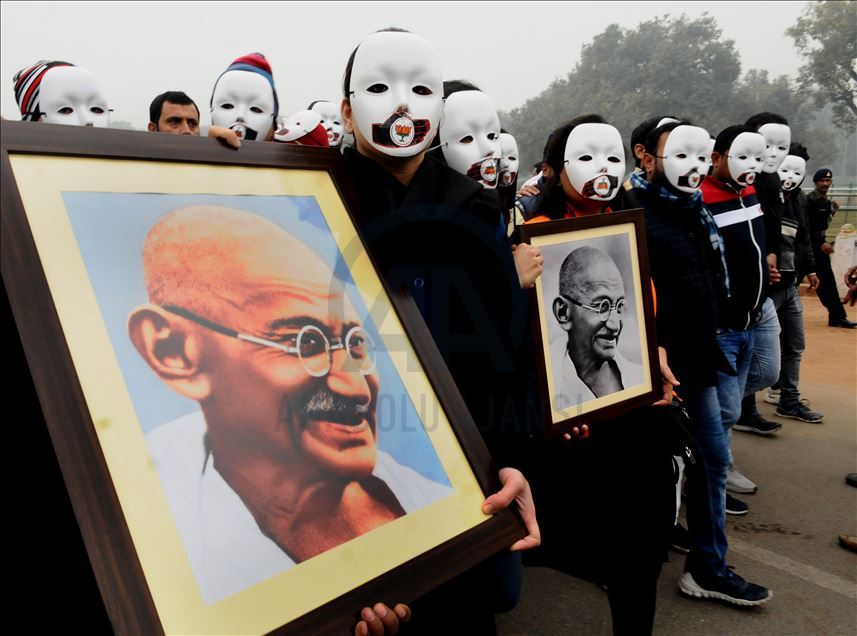
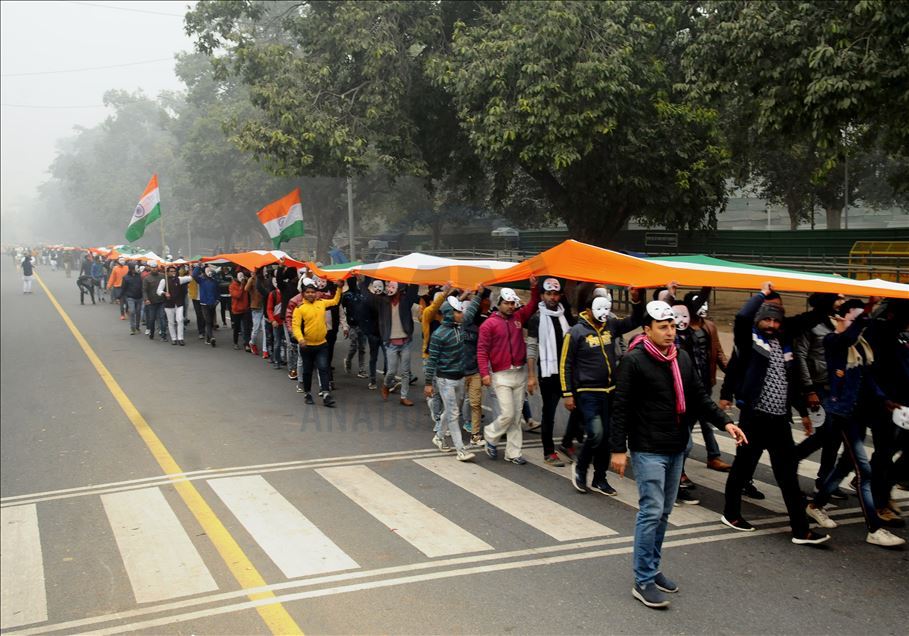



Subscribe to:
Comments (Atom)




